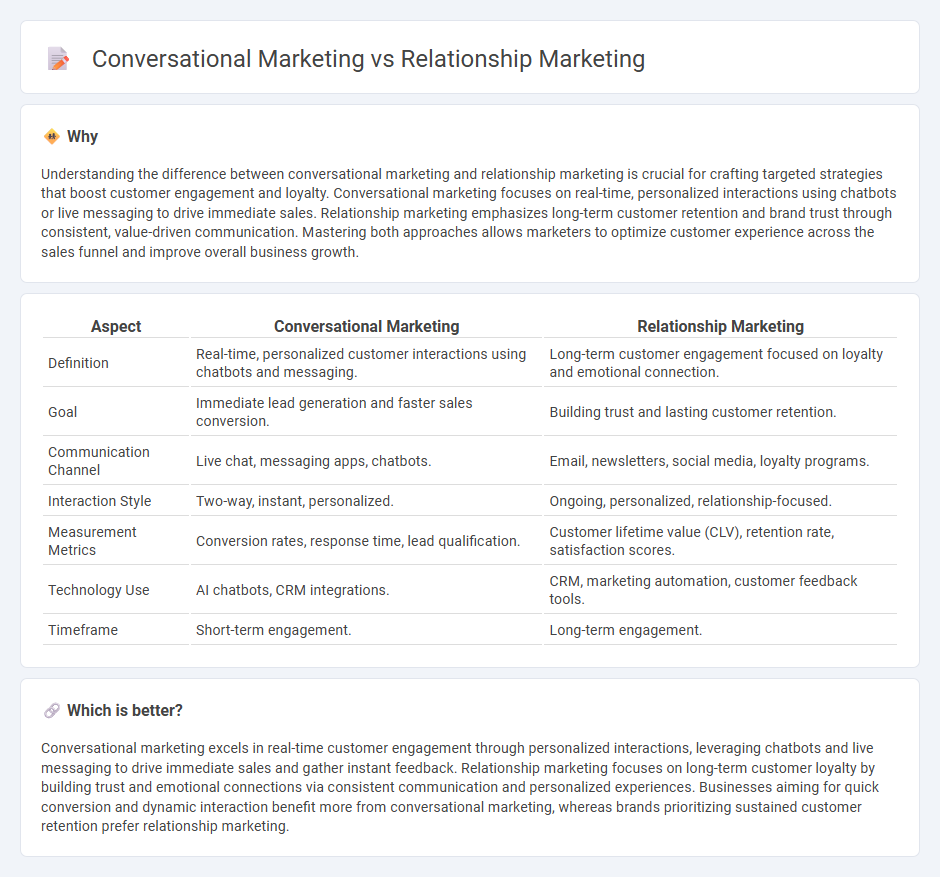
Conversational marketing leverages real-time interactions through chatbots and messaging apps to deliver personalized customer experiences that drive immediate engagement. Relationship marketing focuses on long-term customer loyalty by building trust and ongoing communication using targeted content and reward programs. Explore how integrating both strategies can revolutionize your marketing approach.
Why it is important
Understanding the difference between conversational marketing and relationship marketing is crucial for crafting targeted strategies that boost customer engagement and loyalty. Conversational marketing focuses on real-time, personalized interactions using chatbots or live messaging to drive immediate sales. Relationship marketing emphasizes long-term customer retention and brand trust through consistent, value-driven communication. Mastering both approaches allows marketers to optimize customer experience across the sales funnel and improve overall business growth.
Comparison Table
| Aspect | Conversational Marketing | Relationship Marketing |
|---|---|---|
| Definition | Real-time, personalized customer interactions using chatbots and messaging. | Long-term customer engagement focused on loyalty and emotional connection. |
| Goal | Immediate lead generation and faster sales conversion. | Building trust and lasting customer retention. |
| Communication Channel | Live chat, messaging apps, chatbots. | Email, newsletters, social media, loyalty programs. |
| Interaction Style | Two-way, instant, personalized. | Ongoing, personalized, relationship-focused. |
| Measurement Metrics | Conversion rates, response time, lead qualification. | Customer lifetime value (CLV), retention rate, satisfaction scores. |
| Technology Use | AI chatbots, CRM integrations. | CRM, marketing automation, customer feedback tools. |
| Timeframe | Short-term engagement. | Long-term engagement. |
Which is better?
Conversational marketing excels in real-time customer engagement through personalized interactions, leveraging chatbots and live messaging to drive immediate sales and gather instant feedback. Relationship marketing focuses on long-term customer loyalty by building trust and emotional connections via consistent communication and personalized experiences. Businesses aiming for quick conversion and dynamic interaction benefit more from conversational marketing, whereas brands prioritizing sustained customer retention prefer relationship marketing.
Connection
Conversational marketing fosters real-time, personalized interactions that build trust and engagement, forming the foundation for relationship marketing's long-term customer loyalty. By leveraging chatbots, messaging apps, and live chats, conversational marketing enhances customer experience, which strengthens ongoing relationships and drives brand advocacy. Integrating both strategies results in a dynamic marketing approach focused on sustained customer satisfaction and retention.
Key Terms
Relationship marketing:
Relationship marketing centers on building long-term customer loyalty through personalized interactions and consistent engagement, fostering trust and emotional connections. It emphasizes customer retention and lifetime value by delivering tailored experiences and proactive communication across multiple touchpoints. Explore how relationship marketing can transform your customer engagement strategy.
Customer loyalty
Relationship marketing builds long-term customer loyalty through personalized communication and ongoing engagement, fostering trust and emotional connections. Conversational marketing uses real-time, one-on-one interactions via chatbots or messaging platforms to provide immediate value and enhance customer experience, driving instant satisfaction. Explore how combining these strategies can maximize customer loyalty and business growth.
Long-term engagement
Relationship marketing emphasizes building long-term customer loyalty through personalized interactions and consistent value delivery. Conversational marketing leverages real-time, interactive communication channels like chatbots and messaging to enhance immediate customer engagement and satisfaction. Explore how integrating these strategies can optimize your customer retention and business growth.
Source and External Links
What Is Relationship Marketing? | Definition from TechTarget - Relationship marketing focuses on customer loyalty and long-term engagement to build strong emotional connections with customers, contrasting with transactional marketing's focus on single sales.
Relationship Marketing: 5 Ways to Create Lifelong Customers - This strategy builds emotional and purpose-driven connections by leveraging brand communities, customer feedback, and exclusive offers to enhance customer loyalty and spending.
What is relationship marketing? Definition, Examples, Levels - Relationship marketing is a long-term approach involving stages from initial contact to becoming committed partners, enhancing trust and customer retention through collaborative efforts across company departments.
 dowidth.com
dowidth.com